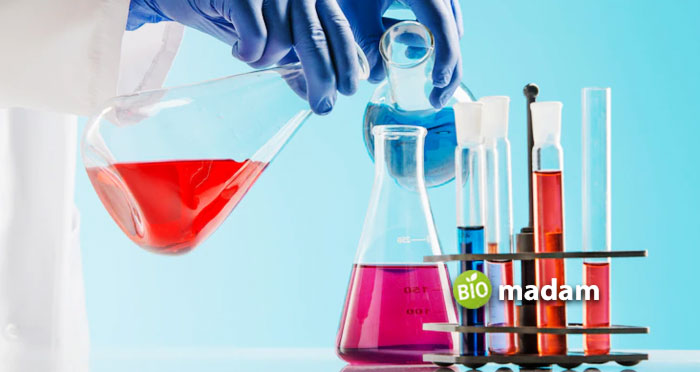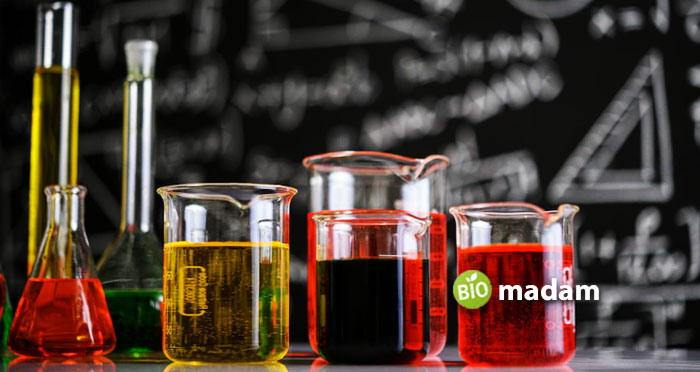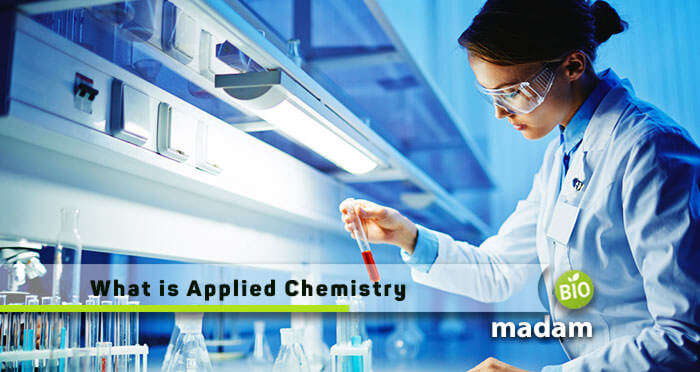Recently updated on March 7th, 2024 at 07:38 am
Our minds come across various questions every day, especially when we relate to the field of chemistry. You might be curious to know how this field spread or maybe what was the reason behind its several sub-branches? Researchers usually prefer opting for applied chemistry to perform numerous experiments and get the results! All these detergents you’re utilizing today to eliminate the stubborn stains work on the principles of chemistry.
Define Applied Chemistry
Applied chemistry is applying the theories and principles of chemistry to practical purposes, understanding the basic chemical properties of materials, and producing new materials.

In simple words, applied chemistry is putting in knowledge to modify things more accurately. Besides, the role of applied chemistry in environmental problems and its contribution to developing new materials increases the interest of scientists these days.
What is the Difference between Pure & Applied Chemistry?
Both these terms are the branches of chemistry, acquiring some prominent differences. Pure chemistry includes pure research containing the basic information of the matter. In addition, it defines how things work, why they work, what they are made of, and how they behave. Pure chemistry utilizes all these subjects to understand and create new theories and also several principles. On the other hand, the course of applied chemistry deals with a variety of chemical fields. These fields worked on various materials, for example, metal compounds, inorganic and organic compounds, polymers, proteins, etc. Researchers in applied chemistry expect to get visible results out of all the practicals done.
What are the Different Fields of Applied Chemistry?
This field comes in a variety of sub-disciplines, specialized for particular applications. The major of them are physical chemistry, materials chemistry, chemical engineering, environmental chemistry, polymer chemistry, and medicinal chemistry. At the same time, polymer chemistry and medicinal chemistry are two major fields that play a specific role in applied chemistry.
Polymer Chemistry
It is the part of applied chemistry used to produce a wide range of polymeric materials, further used for various applications. Polymerization helps generate polymeric material in which monomer molecules undergo a chemical reaction to form a polymer chain. They are additionally classified into biopolymers and synthetic polymers.
Biopolymer (Comprise of Organic Material)
These polymers comprise structural and functional units from organic matter. They are usually derived from amino acids, sugars, etc. One of the many classes of biopolymers is proteins, also known as amino acid derivatives.
Synthetic Polymers
On the other hand, these are derived from petroleum oil and include structural materials manifested in plastics, synthetic fibers, paints, building materials, furniture, mechanical parts, and adhesives.
Medicinal Chemistry
It is another significant discipline of applied chemistry that deals particularly with pharmacology and organic chemistry. This field helps in researching and developing new drugs. Medicinal chemistry allows a medical chemist to practice his chemistry training in the process of synthesizing new drugs.
Applied Analytical Chemistry

Applied analytical chemistry is the study of determining the composition of matter, its structure, qualitative analysis, and also quantitative analysis of its design. This sub-branch helps different organizations launch their processes, such as food production, pharmaceutical industries, etc.
Analytical chemistry interlinks with other disciplines of the science field, including medicine, Earth sciences, forensic labs, archeology, etc. Moreover, it deals with the applications of chromatography, for example, thin layer chromatography, gas chromatography-mass spectrometry, liquid chromatography-mass spectrometry, etc.
Industrial Applied Chemistry
Industrial chemistry also comes under the umbrella of applied chemistry. It includes the synthesis of inorganic chemicals, preparation, classification of heterogeneous catalysts, homogeneous catalysis, oil, gas, and coal in the practice of petrochemicals, synthesis of intermediates, and end products. Enterprises employing industrial chemistry in their work help them transfer the raw matter into essential products for sale.
For example, sodium hydroxide is a strong base that multiple industries apply to get useful results. It works for petroleum industries to increase the pH of viscous items.
Applied Biochemistry
Applied biochemistry uses the knowledge and methods to understand the world’s problems, like investigating the cause of diseases in medicine, studying the effect of nutritional deficiencies, and finding ways for pest control. In addition, biochemistry deals with molecular biology, immunochemistry, physical chemistry, and more.
Geochemistry
This sub-branch of applied chemistry is a powerful exploration tool to detect abnormally high concentrations of chemical elements associated with mineral or hydrocarbon (carbon and hydrogen) deposits. Moreover, geochemistry helps define regional extensive mineral assemblages.
Scientists apply geochemical analysis to natural objects, for example, volcanic gas, dust, air, rocks & sediments, water, etc.
Petrochemistry
This branch of applied chemistry is concerned with transforming petroleum (crude oil) and natural gas into usable materials. Nowadays, Petrochemistry has become a notable branch, just like any other field.
Experts in Petrochemistry are hired to manufacture many daily products, including cosmetics, appliances, medicines, plastics, wind turbines, and solar panels.
Radiochemistry
Another branch of applied chemistry is radiochemistry which deals with both natural and artificial radioactive elements, leading to radioactive decay. It concerns the radioactive isotopes that further help identify the properties of non-radioactive isotopes.
Nowadays, forensic and other laboratories work on DNA through various radiochemical elements, such as radioactive phosphorous.
Biotechnology

The most advanced type of applied chemistry is biotechnology these days. This field makes use of the living bodies’ cells and organs to synthesize different products. Biotechnology is broadly classified to perform in several regions, such as agriculture, healthcare, environmental uses, and industrial processes.
What Jobs Can You Do with Applied Chemistry?
The branch of science provides numerous opportunities to those who are interested and determined. Students after graduating can apply in the following fields and pursue their career of choice.
- Academic researcher
- Analytical chemist
- Biotechnologist
- Chemical engineer
- Clinical scientist, biochemistry
- Forensic scientist
- Nanotechnologist
- Pharmacologist
- Research scientist (physical sciences)
- Scientific laboratory technician
- Toxicologist
Conclusion
There is no end to grabbing more and more information. If you’re concerned about studying applied chemistry as a major subject, make sure you have a strong grip on the basic concepts with full interest. People already in this field are enjoying a good salary as the government has set for them.

Jeannie has achieved her Master’s degree in science and technology and is further pursuing a Ph.D. She desires to provide you the validated knowledge about science, technology, and the environment through writing articles.

